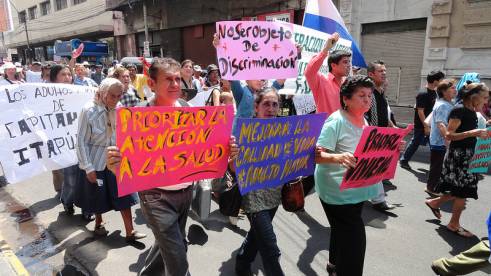By Bridget Sleap
The fourth session of the UN Open-ended Working Group on Ageing (OEWGA) took place last week in New York (12-15 August 2013). The working group was set up in 2010 to discuss the possibility of new human rights instruments to protect older people’s rights.

This year Member States discussed the outcomes of the Madrid Plan (MIPAA+10) review, progress on regional human rights instruments in Africa, Europe and the inter-American region and older people’s rights to social security, health, employment and non-discrimination.
Strong civil society presence
Civil society presence in general was stronger than ever and united in its call for a new convention on the rights of older people. We were there with a strong team of Affiliates and partners from Slovenia, Ireland, Nepal, USA and UK who intervened in all the sessions, side events and NGO briefings, and met with government delegations throughout the week.
We provided evidence about discrimination and rights violations that are happening around the world. We were also there to demonstrate why the Madrid Plan and regional human rights instruments are insufficient to protect older people’s rights. We outlined what the main elements of a new convention should be and spelled out what we would like to see at the next OEWGA meeting.
Our political influencing and Age Demands Action citizen action work before the meeting yielded some good results with, for example, positive interventions from the Slovenian and Nepal Governments. South Africa and Indonesia also offered continued support for a convention.
We were pleased to see other Member States attend for the first time, for example Kyrgyzstan, Haiti and Mozambique. But there were also disappointments: Some Member States who had showed support for a convention last year did not express this support this year. Others who had promised to send delegates to the meeting did not attend.
Our European network
For the first time this year our European network worked on a political influencing strategy for the OEWGA. Our objective was that European Union Member States continue to support the OEWGA and engage constructively in it now and in the future.
We were therefore encouraged to see greater recognition in the EU statements on various issues. These included the gravity of the rights violations and discrimination older people experience, that existing mechanisms are not being used properly in any region and more needs to be done to ensure this.
The way ahead
Member States still remain divided on the need for a new convention on the rights of older people. However, even those who do not think a convention is necessary at this stage recognised the need to continue to discuss how best to protect older people’s rights.
The debate at the OEWGA will continue. We have a lot more work to do to build on our successes and keep the process moving towards a new convention.
